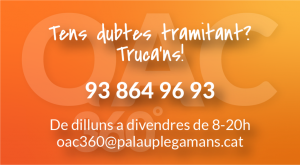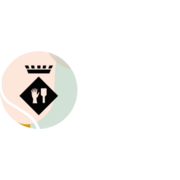Help
A participatory process is a sequence of participatory activities (e.g. first filling out a survey, then making proposals, discussing them in face-to-face or virtual meetings, and finally prioritizing them) with the aim of defining and making a decision on a specific topic.
Examples of participatory processes are: a process of electing committee members (where candidatures are first presented, then debated and finally a candidacy is chosen), participatory budgets (where proposals are made, valued economically and voted on with the money available), a strategic planning process, the collaborative drafting of a regulation or norm, the design of an urban space or the production of a public policy plan.
Process phases
1. Objective
Name the new Municipal Library.
The principles of this process are: binding, universal, deliberative and with a system of guarantee, transparency and good governance.
2. Background
By the plenary session of ... the start of the construction project for the New Municipal Library was approved, ........
With the aim that this project is not a project allied to the citizens, the end user of the library, a participatory process was carried out to obtain proposals and contributions to the use of the different spaces of the future municipal library. The main objective of the debate process is to compile the needs of the locality, but also proposals for the use of the new facility and millions of the winning project for the future facility.
The public library is a service of proximity and a community space with a clearly defined role (cultural, educational...) but it is also a meeting place for neighbours that optimises resources and chooses ideas and active proposals to be more effective and appropriate. That is why incorporating the vision of the citizens is a basic starting point with the aim of achieving a quality, innovative and useful equipment.
Along with the start of the construction works, a second participatory process was initiated to scrutinise the thematic specialisation that the new library should have. This process consists of a series of thematic proposals related to the identity of the municipalities that depend on the promoter and that are defined together with the citizens who are experts in these topics in a participatory workshop.
Subsequently, the voting period was opened to all citizens and was based on the Library's specialisation: renewable energies, nature and the rural environment.
Now, it is time to name the new library and to continue with the conviction that this has to be a decision made by all the veins of the municipality and that the name is sculpted through a participatory process.
The nomenclature of urban lives, spaces and public facilities constitutes a patrimonial wealth that puts language and culture in contact with its territory and, therefore, forms part of the history of the municipality. A living history in which place names are constantly evolving. These names are part of the collective heritage and bring public recognition to the popular way of naming spaces, to a cause, to the memory of a personality, to an event, etc. and add an affective value to the space being named, which helps to reinforce identification with the immediate environment and the citizen's feeling of belonging to the community.
The nomenclature of urban lives, spaces and public facilities is, therefore, a collective heritage of the municipality which, in addition to being an element of information on the history of the places it desires, is the basic identifying element of the territory and serves to delimit and define it.
In view of these characteristics related to the importance of the gazetteer in the rich heritage of the territory, its history and the added value of the names of cars, spaces and public facilities, and together with the desire to include the citizens of the municipality in the construction of the library, Palau-solità i Plegamans Town Council will promote a participatory process so that the citizens and organisations of the municipality can decide by vote on the name of the future municipal library.
3. Criteria for proposals
The proposals come from each educational centre. Neighbours of the municipality can support one of the proposals.
Generic name, not of a natural person, but of a person related to the municipality.
It must be a name that identifies the municipality. Proposals that promote local cultural heritage.
It must be a name related, as far as possible, to the Library's specialised subject, renewable energies, nature and the rural environment.
Proposals have to be briefly motivated. The schools have to submit their proposals by the end of May.
Existing names cannot be repeated in the current gazetteer of Palau-solità i Plegamans.
Each school or institute will have to present its proposal in audiovisual form: For these proposals schools will prepare a short video presenting and defending the reasons for the names they propose and why they should be the stumbling blocks.
The proposals must come from an internal participatory process of the schools themselves. Each school will record this process and the children/classes that participate as a reality.
The proposed name must not contain erotic, pornographic, xenophobic, illegal or illegal content, or content that promotes the apology of terrorism, violence or abuse or any other form that is contrary to, undermines or attempts against the fundamental rights and public freedoms recognised in the Constitution, in international treaties and in the rest of the legislation in force in the world.
4.Voting
Neighbours registered in the municipality over 16 years of age can vote.
The voting period will start on 1xxxxxxxa through this participatory platform that incorporates a participatory identification system with email, NIF and birth data, validated to the municipal census.
There will also be face-to-face appointments at:
Citizen's Advice Bureau
Espai Jove Escorxador
A discount at the state market
A fixed digital voting point will also be set up on the municipal pavement.
5.Counting of votes
The counting of votes will be carried out once the voting phase has finished. The digital votes and the votes from the ballot boxes will be added together.
Once the voting process has been completed, the proposal for final approval will be prepared for the Municipal Plenary.
Quan i com puc votar?
A partir del dia 16/09 a les 09:00h i fins el dia 30/09 a les 12h podeu donar suport a la proposta de nom de la futura nova biblioteca municipal que desitgeu.
VOTACIÓ ONLINE
A l'apartat propostes trobareu les propostes oficials que han proposat els centres educatius del municipi. Es podrà donar suport a una del total de les propostes
VOTACIÓ PRESENCIAL
També s'habiliten punts de votació assistida per aquelles persones que no tenen accés a internet.
l'Oficina d'Atenció Ciutadana ( Plaça de la Vila, 1), podreu votar de dilluns a divendres de 08h a 14h. (Cal mostrar el DNI al personal de l’Oficina d’Atenció Ciutadana).
Can Cortès de dilluns a divendres de 8h a 14h. (Cal mostrar el DNI )
Torre Folch dilluns a divendres de 16h a 21h. (Cal mostrar el DNI)
Pavelló municipal Maria Víctor de dilluns a divendres de 09h a 13h i dimecres de 16h a19h per a votacions assistides. (Cal mostrar el DNI)
Dissabte 14/09/2022 al mercat setmanal, de 10h a 13:30h (Cal mostrar el DNI)
Dissabte 24/09/2022 al Pavelló Municipal Maria Víctor de 10h a 13.30h (Cal mostrar el DNI )
Punt de votació digital fixe al pavelló municipal
Recordeu que per poder votar cal que verifiqueu el vostre compte prèviament.
Podreu votar les persones majors de 16 anys empadronades al municipi.

Com creo i verifico el meu compte?
El primer és crear un compte. Crea i omple les dades que se't demana. És un requisit marcar la casella d'acceptació de les condicions d'ús, i omplir correctament el CAPTCHA (a la part inferior del formulari se'ns presenta una imatge amb unes lletres deformades que hauries d'introduir a la casella inferior com a mesura de seguretat; tingues en compte la diferència entre majúscules i minúscules). Creant un nou compte t’arribarà un correu electrònic a l'adreça que hagis especificat, i hauràs de fer clic a l'enllaç que conté (l'enllaç que posa "Confirmar el meu compte") per acabar de crear el compte.
Un cop creat el compte bàsic, i després d'entrar amb el teu correu i contrasenya, cal fer una verificació bàsica. Per fer-ho, fes clic a l'enllaç "El meu compte" de la part superior dreta, i després al botó "Verificar el meu compte". El primer que se’t demanarà és que introdueixis les teves dades de residència, per verificar que estàs empadronat/da al municipi de Palau-solità i Plegamans (és important introduir el número de document amb la lletra, i marcar la casella d'acceptació d'accés al Padró). Si les dades són correctes, el teu compte et permetrà donar suport a les propostes.
The scrutiny will be carried out from the end of the voting phase. Digital votes and ballot box votes will be added.
Once the voting process is over, the definitive approval proposal will be prepared in the Municipal Plenary and the results will be available on this website.
We choose the name of the new municipal library
Library name
About this process
Once the theme of the new municipal library has been chosen, it is time to decide on the name. The decision process will be a participatory process where the role of the children of the educational centers of the municipality can play a leading, participatory and decisive role.
THE PROCESS
Voting can be done from this portal and in person at the indicated voting points. To vote from here it is necessary that you previously register with a valid email and authenticate yourself.
Voting Points:
Palau-solità i Plegamans City Council Citizen Service Office.
A Saturday at the weekly market.P
The voting period starts on xxxxxxxx until Sunday xxxxxxxxxxxxxx
All people, over 16 years of age, registered in the municipality of Palau-solità i Plegamans can vote for one of the following proposals:
These proposals




Share